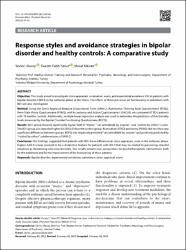Response styles and avoidance strategies in bipolar disorder and healthy controls: A comparative study
Künye
Ulusoy, S., Yavuz, K. F. ve Erkıran, M. (2022). Response styles and avoidance strategies in bipolar disorder and healthy controls: A comparative study. Journal of Psychiatry and Neurological Sciences, 35(1), 24-33. https://doi.org/10.14744/DAJPNS.2022.00168Özet
Objective: This study aimed to investigate stress appraisals, rumination, worry, and experiential avoidance (EA) in patients with bipolar disorder-I (BD-I) in the euthymic phase of the illness. The effects of these processes on functionality in individuals with BD-I a re also investigated.
Method: Using the Stress Appraisal Measure Dispositional Form (SAM-D), Ruminative Thinking Style Questionnaire (RTSQ), Penn State Worry Questionnaire (PSWQ), and Acceptance and Action Questionnaire-II (AAQ-II), we compared 67 BD-I patients with 70 healthy controls. Additionally, multiple linear regression analysis was used to determine the predictors of functionality levels measured by the Bipolar Disorder Functioning Questionnaire (BDFQ).
Results: BD-I group showed significantly higher SAM-D "threat," "uncontrollable by anyone," and "control by others" scores. The BD-I group also reported higher EA (AAQ-II) than the control group. Rumination (RTSQ) and worry (PSWQ) did not show any significant differences between groups. BDFQ was negatively predicted "uncontrollable by anyone" and positively predicted by "control by others" subdimensions of SAM-D.
Conclusion: Our findings suggested that patients with BD-I have differences in stress appraisals, even in the euthymic phase. Higher AAQ-II scores seemed to be a distinctive feature for patients with BD-I that may be related to perceiving stressful situations as threatening and uncontrollable. Our results present new perspectives for psychotherapeutic interventions both for the treatment and for the improvement of the functioning of these patients.


















